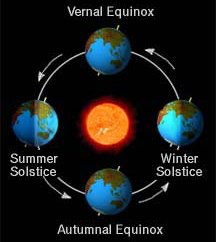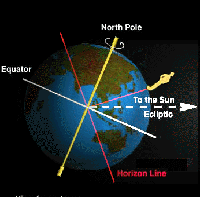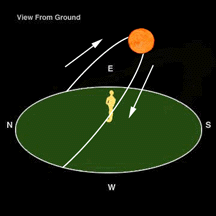One of the most popular theories proposed for the purpose of the glyphs is that they are solstice markers or some kind of ancient calendar.
While there are clear indications that the ancient inhabitants of the southwest were accomplished astronomers, including the much publicized discoveries in Chaco Canyon and in Central Texas, the research team does not feel that this is a valid theory as to their intended use.
To date, more than 120 glyphs (of the 370+ total found) have been located, within negligible deviation from 37°00'04" latitude, pointing to more than 90 different compass azimuths ranging from 0° to 359°.
Although the team does not rule out the possibility that the glyphs may have some calendarical significance, (perhaps lunar instead of solar), current data would suggest this theory appears is invalid.
| Understanding basic principals of solstices is pretty simple: |  |
The Earth
is actually nearer the sun in January than it is in June, [by three million
miles] , and our
Earth leans slightly on its axis, 23 degrees and 27 minutes off
perpendicular to the plane of it's orbit.
 |
|
"Solstice"
actually means "Sun-stands-still"
|
|
 |
This is an important fundamental principal because the apparent movement of the Sun is relative to your position on the surface of the earth. However, this relative movement is negligible if your position on the earth, or degrees Latitude from the equator, does not change.
These 120 glyphs have been found over a 5,000 square mile area, and their latitude never varies more than 20 miles from 37°00'04" latitude, which for the purposes refuting the solstice theory as the primary function of the marks, is a negligible deviation.


| TEAM MEMBERS | WORKS CITED
CONTACT US @ WATER GLYPHS

